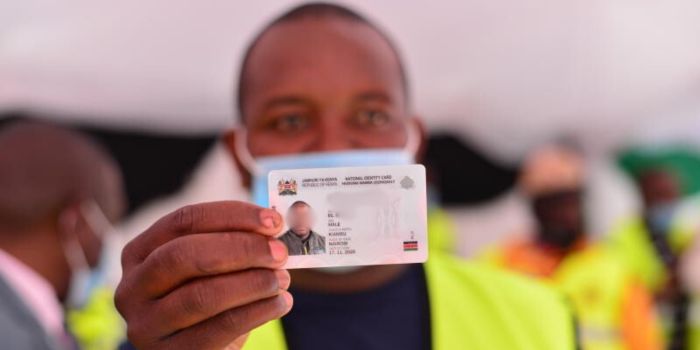Civil society groups slam new Maisha Namba cards, cite election rigging concerns

The groups expressed scepticism and concern over the validity and implications of the new identification model, terming it a scheme to rig elections in 2027.
Members of Kenya's civil society organisations have opposed the newly issued unique personal identification number, known as the Maisha Namba.
In a press conference on Sunday, the groups expressed scepticism and concern over the validity and implications of the new identification model, terming it a scheme to rig elections in 2027.
More To Read
- Petition challenges legality of Maisha Namba, cites marginalisation and privacy risks
- State begins issuance of Maisha cards to KCSE candidates
- Government issues notice on IDs, birth certificates and driving licenses
- All 2024 KCSE candidates to receive Maisha Cards before finishing exams
- Nubians want Ruto's promise on elimination of ID applicants vetting implemented
- Court lifts order barring issuance of Maisha cards
They highlighted that the new IDs are set to expire in 2032, coinciding with the end of President William Ruto’s current term, should he be re-elected in the 2027 polls.
“The Maisha number comes with an expiry date, which raises serious questions. IDs play a crucial role in voting processes, and the expiration date on these new cards is suspicious. We are concerned that this could be a scheme to rig the 2027 elections,” the groups said.
However, in the new ID cards seen by the Eastleigh Voice, some show an expiration date set for 2033 and another one for 2034.
In February of this year, the Kenya Kwanza government was given the leeway to roll out the new digital identity cards, popularly known as Maisha Namba, after the High Court lifted an order filed against it.
It also ordered the case to be transferred from the Judicial Review Court, where it had been filed, to the Constitutional Division of the High Court.
High Court judge John Chigiti had in December last year stopped the government from rolling out the Maisha Namba pending the determination of a petition filed by the Katiba Institute.
The Maisha card, which bears the Maisha Namba, is essentially a third-generation ID, set to replace the current second-generation ID.
 A Kenyan National ID Card. Photo: X/Huduma Kenya
A Kenyan National ID Card. Photo: X/Huduma Kenya
It serves as a unique personal identification number assigned to Kenyan citizens upon registration, typically at birth. The number becomes their lifelong personal identity number from birth to death.
For newborns, Maisha Namba also serves as their birth certificate number, facilitating registration in educational institutions, the National Health Insurance Fund (NHIF), and transitioning to an ID number once they reach 18 years.
It will also function as their Personal Identification Number (PIN) for accessing various government services, including the Kenya Revenue Authority (KRA), National Social Security Fund (NSSF), NHIF, and NEMIS throughout their lifetime. This master database will manage data for all registered citizens, refugees, and foreigners using fingerprint biometric technology, enhancing data accuracy and reliability.
It consolidates existing independent databases into a single integrated register, serving as the central reference for all data related to Kenyan citizens and foreign residents in the country.
On the other hand, the Digital ID has a digital representation of an individual, organization, or device, typically encompassing personal attributes, credentials, and authentication.
It also has enhanced security features, including a microprocessor electronic chip with encrypted data, rendering forgery and manipulation nearly impossible.
The card features a photo image of the applicant, an ID number, a card serial number, biometric data, biographic data, residential particulars, and advanced security elements.
Meanwhile, the civil society groups also called on the president to act on the alleged police brutality during the recent anti-government protests. They emphasised that all those who have been abducted should be released, and the charges levelled against them should be dropped.
“President Ruto should ensure the release of those abducted, drop charges against the accused, and cease profiling young people. We also urge him to recognise the media practitioners who have been targeted, including the recent abduction of Macharia Gaitho (veteran Nation Media journalist) and the mistreatment of Francis Gaitho (a social media influencer),” the groups said.
Top Stories Today












































